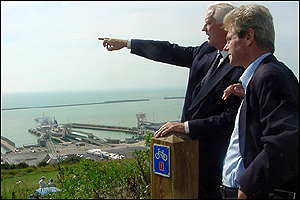| You are in: Europe | |||||||||||||||||||||||||||||||||||||||||||||||||||||||||||||||||||||||||||||||||||||||||||||||||||||||||||||||||||||||||||||||||||||||||||||||||||||||||||||||||||||||||||||||||||||||||||||||||||||
|
Tuesday, 28 August, 2001, 16:56 GMT 17:56 UK
Cross-channel views of the euro

Polls show most British people do not want the euro
By William Horsley
Dover and Calais face each other across just 22 miles of the English Channel - but they appear to be drifting ever further apart. On a day trip from Dover to Calais by boat, to compare attitudes in and out of Euroland, I found that the mentality gap was widening.
The British will be the largest European Union nation out of the euro when it appears in the form of notes and coins on 1 January next year. They will keep the pound until such time as a majority of the people votes otherwise in a referendum. Opinion polls show the British want to stay out of the euro by a margin of at least two to one. English defiance My point of departure was the white cliffs of Dover, an old symbol of English defiance. I went up there with Ray Haines of the Kent Maritime Chamber of Commerce, who pointed at the thriving ferry port below, and said: "Since William the Conqueror, people in Kent have resisted Europeans whenever they attempted to take us over by force. "We are quite happy to trade, but we will still resist attempts to take us over."
Ray Haines says he and other business people in Kent can see the good commercial arguments for Britain going into the euro. But many are against doing so because of the interference that would come with being part of Euroland. "They want to dictate to us our rate of taxation and policies on a whole range of things," Ray says. "And we may be asked to make constitutional changes which we do not want." Mixed opinions In the ferry terminal one Scottish traveller, who had just changed pounds into francs for his journey, disagreed.
But most British people I spoke to said they were happy the UK is staying out. One woman on her way to a holiday in Spain said if Britain joined the euro "we would lose our individuality." Her son, a university student, was adamant that Britain should stay out. He said Britain is strong enough economically to go it alone. "That keeps us separate from the rest of Europe, which is good. We are freer to trade with other nations around the world, not just Europe." Computers reprogrammed Calais will in future be the main gateway to Euroland for people travelling from Britain.
All prices are clearly displayed in euros as well as in French francs. The euro price tags have been there since April. This is the third largest shopping complex in Europe, and its finance manager Anthony Tessier told me the top priority now was to make the birth of the euro as easy as possible. "We are training all 600 members of our staff," he explained. "And we are re-programming our computers to do the accounts in euros. "We expect a lot of confusion among our customers in January, when the money first appears. Most French people don't like change. They are resigned, but they are not looking forward to the coming of the euro." The conversion from francs is not easy - one euro is now worth about six and a half francs. Computer games are being marketed with quizzes and puzzles aimed at getting people used to the calculation. Price freeze Anthony says this store has strict rules designed to reassure shoppers that they will not lose out because of the changeover. Prices in francs are rounded up or down to the nearest fraction of a euro according to strict rules, to avoid suspicions that prices are going up. All the prices will be frozen from 1 September until early next year. There is also a full-time Customer Service desk to answer people's euro questions. I found French shoppers generally much more positive than the British. One family man buying children's clothes was sure: "The euro is a good thing. No more exchange costs, and no more messing around at the bank changing money. It'll be good for everyone." In the music department I found people half-hearted but resigned. A French housewife told me "It's not going to be easy, using euros. But at least it will make life simpler when we go abroad - except to England, of course. The English are doing things differently, as usual!" Growing apart That was a comment I heard from a lot of French people. They are not overjoyed at the prospect of giving up their francs for euros, but they know it is their fate, along with 300 million other Europeans, to scrap their existing currencies. The British are still "doing things differently". Keeping the pound cements that difference - for now anyway. On my way back home I had the impression that the English Channel is growing just a little wider than it was. |
See also:
24 May 01 | Business
16 May 01 | Media reports
02 Jul 01 | Europe
18 May 01 | Europe
13 Apr 01 | Europe
14 Feb 01 | Europe
Internet links:
The BBC is not responsible for the content of external internet sites Top Europe stories now:
Links to more Europe stories are at the foot of the page.
|
|||||||||||||||||||||||||||||||||||||||||||||||||||||||||||||||||||||||||||||||||||||||||||||||||||||||||||||||||||||||||||||||||||||||||||||||||||||||||||||||||||||||||||||||||||||||||||||||||||
|
Links to more Europe stories |
 |
||
| ----------------------------------------------------------------------------------
To BBC Sport>> | To BBC Weather>> | To BBC World Service>> ---------------------------------------------------------------------------------- © MMIII | News Sources | Privacy |